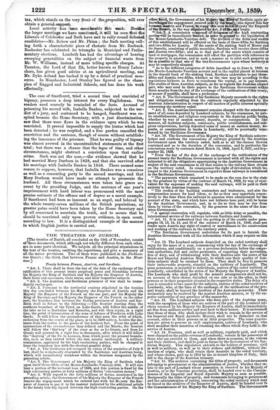The announcement that the two Houses of Parliament stand prorogued
until the 24th January, then to meet for the despatch of business, and to consider divers important and urgent affairs promises a busy as well as an early session. Government will meet the Legislature with a most abundant share of activities. Independently of the Reform Bill, towards which the inquiries going forward have been all the more valuable for their strictly Practical character ; besides bills for the improvement of the law equally practical, there will be the naval and military extensions to which we have alluded in previous numbers ; and above all there will be the transactions of the European Congress.
One subject which will come before the House of Commons has flu destiny prearranged for it. The shipowners, or at least such shipowners as ascribe the depression of their trade, not to their own management, but to the, repeal of the Navigation laws, have met in conclave at the London Tavern and have resolved. to bring their case before Parliament with a motion for inquiry. There are likely to be two, if not more, rival motions. Mr. Crawford is to move one, Mr. Fenwick has another, Mr. Lindsay a third, and Lord John Russell is to present a petition, if he will. We have discussed the case itself in a separate paper ; there is reason, however, to doubt whether the shipowners are really a united body,—they have not, in some cases where they have made local demonstrations, been able to carry their own point. The vehe- mence of the attacks upon Mr. Lindsay at the London Tavern, the obstinate refusal to listen to his reasons, and the implicit con- fidence shown in Mr. George Frederick Young, imply that the gen- tlemen at the London Tavern want either the courage or the in- sight to deal with things as they now are. The object is to re- store Reciprocity or some equivalent, but they do not venture to #sk for more than inquiry ; and the fate which will attend their movement, should it not meet with a total and immediate failure in the House of Commons, is that it must result in a blue- book confirming the policy of free trade, the Navigation laws in, eluded.
Politically more importance attaches to the movement which has been formally initiated at the Liverpool meeting of Financial Reformers. It is clear that Mr. Bright and those who are acting with him will concentrate all the support of their party in favour
of their particular plan. It seems from the speeches, and from Mr. Cobden's letter, to comprise a substitution of a direct taxa-
tion for an indirect, and a reduction of expenditure, particularly in the military and naval departments. It is Mr. Cobden who indicates a policy of reduction, Mr. Bright who contemplates an increase of direct taxes upon property and income with the pro-
spective abolition of Customs and Excise. In a speech of bril- liant success he carried his motion without a dissentient voice,—
that is to say, in the Liverpool banqueting room. We are still without any evidence that the party has increased its support out of doors, and we doubt whether the idea of an increased Income-
tax, which stands on the very front of the proposition, will ever obtain a general support.
Local activity has been censicbrable this week. Ilesibe the larger meetings we have raentiossect it still be seen that the Liberals of Colchester and Bath have met to rally round,tiefeated, candidates—Mr. Rebow and Mr. Phinn ; the Bath meeting call- ing forth a characteristic piece of rhetoric from Mr. Roebuck. Rochester has celebrated its triumphs in Municipal and Parlia- mentary elections. Lambeth has had the advantage of hearing sweeping generalities on the subject of financial waste from Mr. W. Williams, instead of more telling specific charges. At Taunton, the Lord of that Ilk, better known as Henry Labou- ohere, has given good advice at an agricultural meeting, and Mr. Dyke Acland has backed it up by a detail of practical mea- sures. In Manchester, Lord Stanley has figured as the cham- pion of Ragged and Industrial Schools, and has done his work effectually.



























